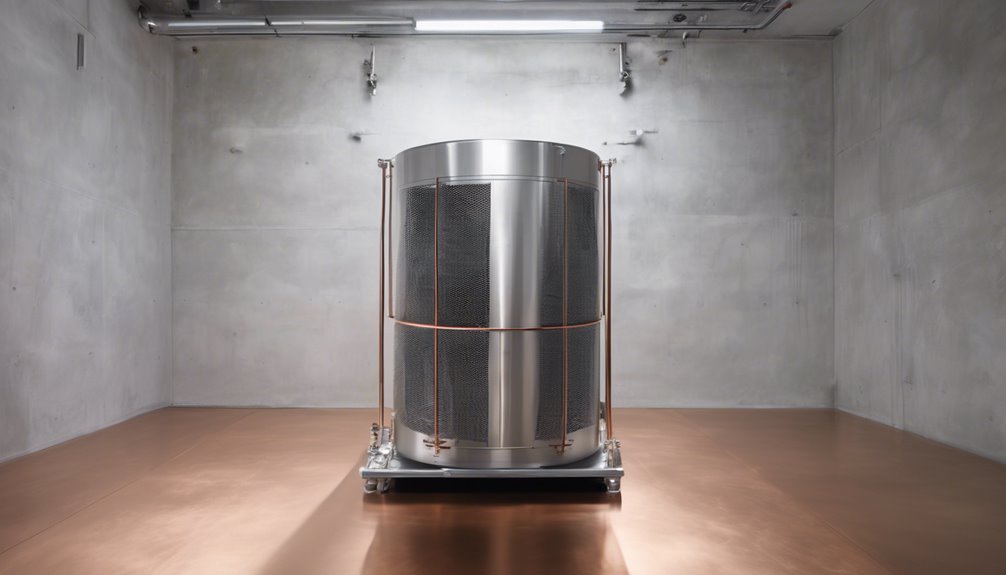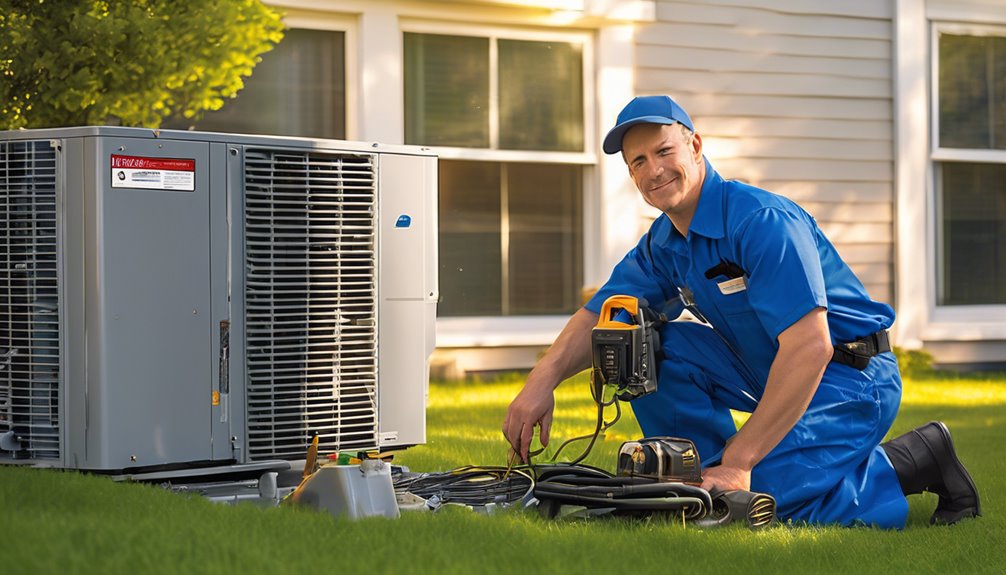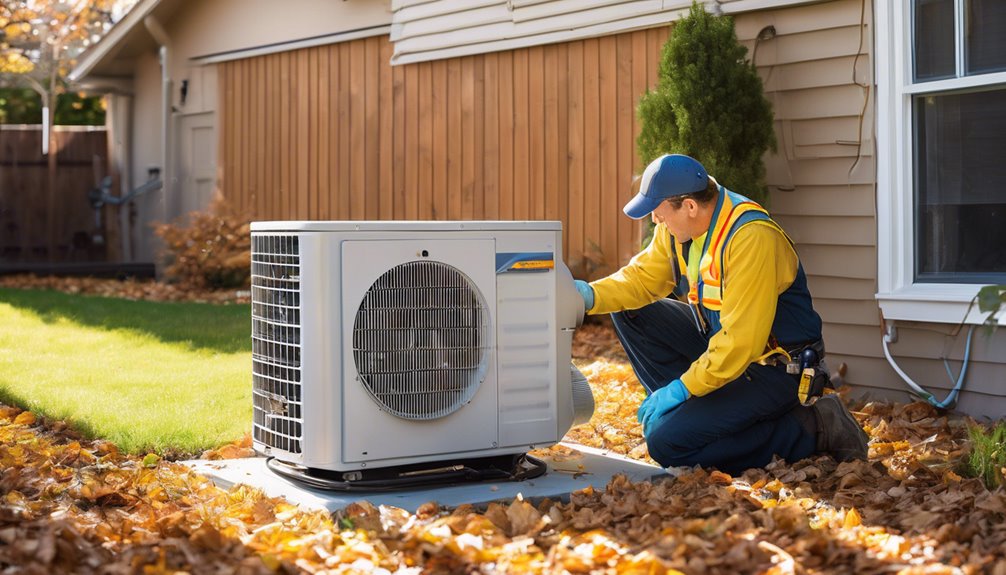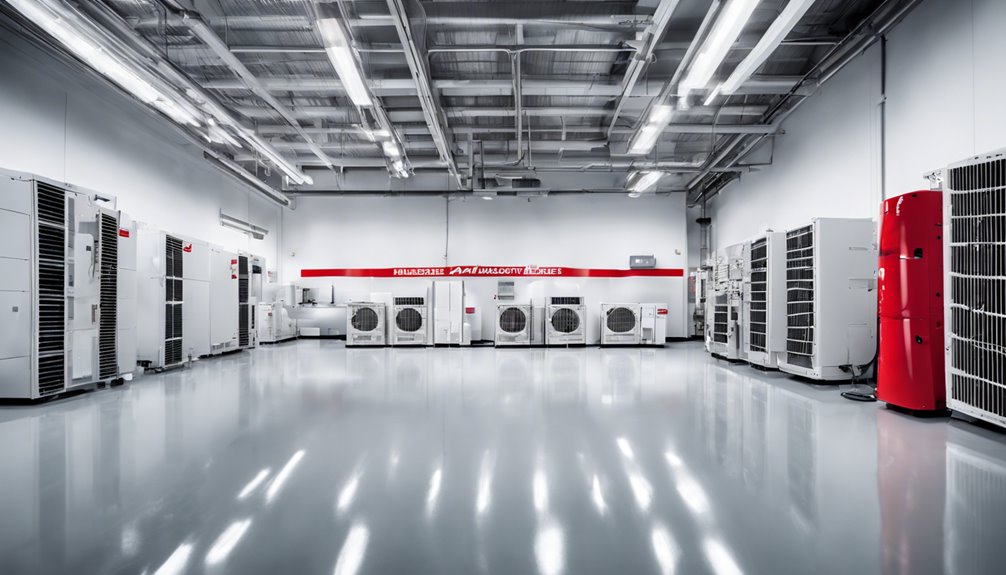To reduce AC compressor noise, start by pinpointing the source of the sound using noise mapping and acoustic analysis. Then, maintain and inspect the compressor by removing debris, checking for loose parts, and cleaning or replacing the air filter. Next, reduce vibration and noise by wrapping the compressor and pipes with acoustic shielding materials and applying pipe wrapping materials. Finally, consider soundproofing and sealing measures, such as caulking cracks and using sound-absorbing materials, to minimize the disturbance – and there's more you can do to silence that noisy compressor.
Key Takeaways
- Identify the source of the noise using noise mapping and acoustic analysis to target noise-reducing efforts effectively.
- Maintain and inspect the AC compressor by removing debris, checking for loose parts, and ensuring proper airflow and alignment.
- Reduce vibration and noise by wrapping the compressor with acoustic shielding materials, applying pipe wrapping materials, and insulating connections.
- Seal air leaks, use sound-absorbing materials, and create a barrier between the AC compressor and living space to minimize noise.
- Consider replacing the compressor with a quieter model, placing it in a soundproofed enclosure, or using a white noise machine to mask the noise.
Locate and Identify the Source of the Noise
When you're trying to reduce AC compressor noise, the first step is to pinpoint the source of the sound.
You can't fix what you can't find, after all. To get started, try noise mapping to identify the loudest areas around the compressor.
This will give you a visual representation of where the noise is coming from. Take it a step further with acoustic analysis to break down the sound into its component frequencies.
This will help you determine if the noise is coming from the compressor itself, the fan, or another part of the system. By pinpointing the source, you'll be able to target your noise-reducing efforts effectively.
Clean the AC Compressor and Surrounding Area
You'll want to start by removing any debris and dust that may have accumulated on the AC compressor and surrounding area, as these can contribute to noise.
Check for loose parts, such as screws or bolts, and tighten them if necessary. A clean and well-maintained compressor is essential for reducing noise, so take the time to do it right.
Remove Debris and Dust
Dust and debris accumulation around the AC compressor can be a significant contributor to excessive noise.
You'll want to remove any debris that's accumulated around the compressor and its surrounding area. Start by turning off the power to the AC unit.
Then, gently vacuum or brush away any loose debris, paying attention to the air filter and its housing.
A clogged air filter can reduce airflow, causing the compressor to work harder and generate more noise.
Check the filter and replace it if it's dirty. By removing debris and dust, you'll help reduce the strain on the compressor and minimize noise.
Check for Loose Parts
Check the AC compressor and its surrounding area for any loose parts that could be causing the noise.
Over time, bolts and screws can work themselves loose, leading to rattling and vibrating components that contribute to the noise.
- Check compressor bolts and screws to ensure they're tightened securely
- Inspect the compressor mounts and replace them if they're worn out
- Look for any loose wires or connections that could be causing the noise
- Verify that the compressor is properly aligned and balanced
- Check the surrounding area for any loose objects that could be vibrating against the compressor
Check and Balance the Compressor Mounting
The compressor mounting system plays a crucial role in reducing AC compressor noise, as an unbalanced or loose mounting can amplify vibrations and noise.
You'll want to inspect the mounting system to ensure it's properly secured and balanced. Check the mounting techniques used, such as rubber mounts or springs, to ensure they're in good condition and properly aligned.
Perform a vibration analysis to identify any imbalance or misalignment issues. Make adjustments as needed to balance the mounting system, which can significantly reduce noise and vibration.
Insulate the Compressor and Associated Piping
You can significantly reduce AC compressor noise by insulating the compressor and its associated piping.
This is because the compressor and pipes can vibrate and radiate noise. By wrapping them with insulation, you can absorb these vibrations and reduce the noise.
- Use acoustic shielding materials, such as foam or fiberglass, to wrap the compressor and pipes.
- Apply pipe wrapping materials, like rubber or vinyl, to the pipes to reduce vibration.
- Ensure the insulation is securely fastened to prevent it from coming loose over time.
- Insulate the compressor and pipes in areas where they meet or connect to reduce vibration transfer.
- Consider using a combination of insulation materials for maximum noise reduction.
Replace Worn or Loose Parts
You'll want to start by inspecting the mounting hardware that holds the compressor in place, as loose or worn-out parts can cause vibrations that contribute to noise.
Next, you should check the belt tension, as a loose belt can also generate excessive noise.
Inspect Mounting Hardware
Tighten the mounting bolts and take a closer look at the compressor's hardware – it's time to inspect for worn or loose parts that might be contributing to the noise.
You'll want to check the mounting brackets, vibration dampening materials, and any other components that secure the compressor in place.
- Inspect the mounting brackets for signs of wear or damage, and replace them if necessary.
- Check the vibration dampening materials, such as rubber mounts or springs, to ensure they're still effective.
- Look for loose screws, bolts, or nuts that may be causing the compressor to vibrate excessively.
- Verify that the compressor is properly aligned with the mounting hardware.
- Make sure all electrical connections are secure and not loose, as this can also contribute to noise.
Check Belt Tension
The compressor's belt tension can have a significant impact on its overall noise level.
If the belt is too loose, it'll cause the compressor to vibrate more, resulting in increased noise. On the other hand, if it's too tight, it'll put additional stress on the compressor's bearings, leading to premature wear.
You should check the belt regularly for signs of wear, such as cracks or fraying. Make sure it's properly aligned with the pulleys to prevent uneven wear. If you notice any issues, replace the belt with a new one.
Proper belt tension and alignment will help reduce the compressor's noise output and ensure it runs smoothly.
Install a Noise-Reducing Compressor Blanket
A noise-reducing compressor blanket is a simple yet effective solution to minimize AC compressor noise.
By wrapping your compressor with a sound-absorbing material, you can significantly reduce the noise it produces. This is especially useful if you have a compressor located near a living area or bedroom.
- Look for a blanket with a high sound absorption coefficient to ensure maximum noise reduction
- Choose a blanket that's specifically designed for compressor wrapping to ensure a snug fit
- Make sure the blanket is durable and can withstand outdoor weather conditions
- Consider a blanket with a waterproof coating to protect your compressor from moisture
- Follow the manufacturer's instructions for proper installation to ensure optimal noise reduction
Consider Upgrading to a Quieter AC Unit
If you're still bothered by AC compressor noise after trying other solutions, it might be time to consider upgrading to a quieter AC unit. New Generation AC units are designed with energy efficiency in mind, which often means they're quieter than their older counterparts.
| Feature | Quieter AC Unit | Traditional AC Unit |
|---|---|---|
| Noise Level | 30-40 dB | 50-60 dB |
| Energy Efficiency | High | Low |
| Compressor Type | Inverter-driven | Traditional |
| Operating Cost | Low | High |
| Warranty | 10-15 years | 5-10 years |
Upgrading to a quieter AC unit can be a significant investment, but it may be worth it for the peace of mind and improved quality of life it can bring.
Implement Soundproofing Measures in the Room
You'll be happy to know that implementing soundproofing measures in the room can be a cost-effective way to reduce AC compressor noise.
These measures can be especially helpful if replacing the AC unit isn't an option. By reducing the noise that escapes the room, you can enjoy a quieter space.
Some soundproofing measures you can take include:
- Installing acoustic panels on walls and ceilings to absorb sound
- Placing sound barriers, like mass-loaded vinyl or acoustic foam, on walls and floors
- Sealing gaps and cracks around doors and windows with acoustic sealant
- Using sound-dampening curtains or drapes
- Adding area rugs and upholstered furniture to absorb sound
Frequently Asked Questions
Can I Use a Regular Blanket to Reduce Compressor Noise?
You can try using a regular blanket to reduce noise, but it's not the most effective solution. For better sound dampening, you'll want a material with proper noise insulation properties, like acoustic foam or specialized soundproofing blankets.
Will a Quieter AC Unit Increase My Electricity Bill?
You're wondering if a quieter AC unit will hike your electricity bill. In general, energy-efficient units might increase upfront costs, but a thorough cost analysis shows they often lead to long-term savings, so you'll likely break even or even save money in the long run.
Can I DIY Soundproofing Measures or Hire a Pro?
You're wondering if you should DIY soundproofing measures or hire a pro. You can buy soundproofing materials online, but if you're not handy, consider hiring a professional for customized solutions and optimal results with their expert assistance.
How Often Should I Clean the AC Compressor and Surrounding Area?
You should clean the AC compressor and surrounding area every 1-3 months to prevent dust accumulation, which can reduce airflow and efficiency. Regular filter maintenance is also crucial to ensure optimal performance and minimize potential issues.
Will Reducing Compressor Noise Affect the Ac's Cooling Performance?
You're wondering if reducing noise will impact your AC's cooling performance. Fortunately, noise reduction methods often improve cooling efficiency, as a quieter compressor operates more smoothly, allowing for better airflow and heat transfer, which can even boost overall system performance.
Conclusion
You've taken the necessary steps to reduce the annoying AC compressor noise. By locating and addressing the source, cleaning, balancing, insulating, and replacing worn parts, you've minimized the racket. Adding a noise-reducing blanket and considering an upgrade to a quieter unit have further silenced the noise. Finally, soundproofing the room has created a more peaceful space. Now, sit back and enjoy the sweet silence!



